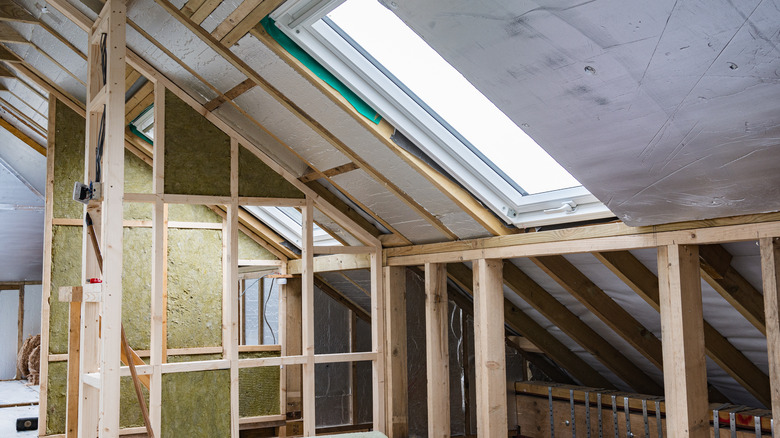Important Things To Consider Before You Gut Your Home
Sometimes for things to look a lot better, they have to look a lot worse first. That's often the case when remodeling your home. In order to get your dream home design, you may need a blank slate. And that calls for a gut job. According to Beantown Builders, gutting means stripping a home down to the studs. The term is also used incorrectly as a blanket term for all remodels. But remodels with cosmetic changes aren't considered gut jobs.
Gutting a house allows you to make extensive updates to the home. You can change the layout, location of walls and support beams, and update the electrical and plumbing components. Essentially, you're creating a completely new interior whether you're gutting a room or the entire house. Since this is such an extensive project, you have to go into it prepared. Before you start ripping down drywall, these are a few things to consider.
Where will you live during construction
Big question: Where will you live during construction? You can't live in a room that isn't there. Gutting a home often means you'll be without water, electricity, or walls. Even if you aren't gutting your whole home, living through construction is not easy. There is dust and noise that can interrupt your daily routine. A major renovation can disrupt your entire life.
Of course, staying in your home during construction is possible in some cases and it can save you some money. But living on a construction site is not always optimal. If you plan to move out temporarily, you have a few options. Furniture rental company CORT suggests short-term rental apartments, a rental home, an RV, or an extended-stay hotel.
You should also consider who has to move out for construction to happen. While an adult may be able to deal with some dust from construction, that's not the best situation for children. How long you'll have to move out should be a factor as well. If it's going to be a few months or a year of construction, renting a house may be more comfortable than a hotel.
Brush up on building codes
When you imagine your dream home, what do you see? A new floor addition? A larger kitchen? Unfortunately, sometimes you can't do everything you want in a construction project legally. Local and state building codes can often dictate what you can do with your home. Building codes can tell you if you're able to have another structure on your property or what materials you have to use for your pipes or how far apart ceiling light fixtures can be. These may seem like minor details, but these codes have to be followed in order for your home to be deemed as a legal, livable structure. The issue is that building codes vary from municipality to city to state.
Despite the potential difficulty, building codes must be followed. So before starting any kind of renovation, you want to check the building codes where you live. B4UBuild suggests checking the local building code department, state government pages, and county government pages for building codes that apply to you. To perform most renovations, you'll also need building permits and inspections; you can often find these resources on those sites as well.
Don't hesitate to hire
There is a tutorial to do just about everything, but some things are better left to the professionals. Some jobs homeowners will be able to tackle themselves, such as cosmetic projects like painting, tiling, or replacing fixtures. These tasks can be done without any professional experience, though it is good to have a background to make sure it's done right. But other home projects should be handled by a pro.
Flooring, room additions or expansions, shower installations, and ceiling replacements are all projects best done by professionals, according to Coldwell Banker. Hiring a professional often ensures that the home will be done right the first time and follow all necessary codes and regulations. While doing it yourself can save money, it can also make you spend more in the future if it's not done right. Before hiring, it's important to do research on professionals to compare their past projects, reviews, and prices to ensure you're finding the right one to work with.
Safety first
If you're going to hand any part of the gut job yourself, it's important to make safety a top priority. Don't go in swinging without any preparation. You want to make sure you have the right tools to perform whatever job you're attempting. Also be sure to protect yourself with the proper safety equipment like goggles, gloves, and dust masks. Before tearing down any walls for gutting, you may want to get your home tested for mold so you can take the proper precautions before removal.
One thing you have to be really cautious of is asbestos, which is often present in older homes and building materials. According to the U.S. Environmental Protection Agency, looking at a material won't be able to tell you if something contains asbestos. If you think your home may have asbestos, it's not the end of the world. Materials with asbestos that aren't damaged or disturbed often don't pose a health risk to homeowners. It's best to leave these materials alone, especially if they're in good condition. Then you can call asbestos removal professionals to test and remove any asbestos in your home.
Be ready for hidden and unexpected costs
You've sat down and created a budget that covers everything you want to accomplish. You have a plan to get through the renovation. But did you factor in hidden and unexpected costs? It's very rare that a renovation will go perfectly. Whether you're gutting one room or the entire house, something will probably go wrong that you weren't expecting it. There might be water damage or pests or something you have to update to meet current building codes.
When creating your renovation budget, be sure to set money aside for unexpected or hidden costs. Murray Lampert warns that a higher electricity bill is a hidden cost that most homeowners don't think about before starting a renovation. The construction site will probably have tons of power tools running, which can raise that bill by the end of the month. Permits are another hidden cost because they aren't free. Working with an experienced contractor can help you create a budget that covers all the expenses you may face, including a contingency.





